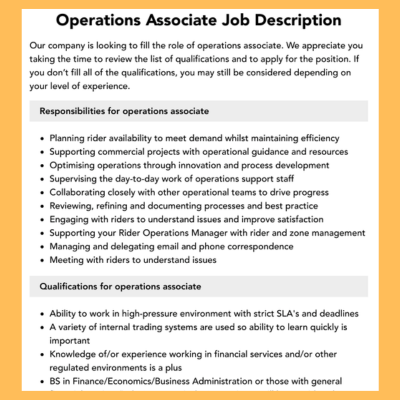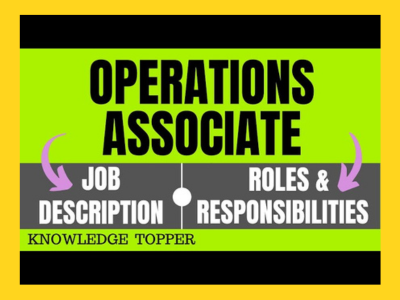An Operation Associate is a professional who helps to ensure the smooth running of an organization. They are responsible for a wide range of tasks, from clerical work to customer service to human resources. If you’re interested in becoming an Operations Associate, there are a few things you should know.
First, it’s important to understand the role of an Operations Associate. They work closely with Operations Managers to ensure that business operations run smoothly. They are responsible for organizing documentation and information, providing suggestions and feedback on business processes, and collaborating with managers to determine task assistance needs.
To become an Operations Associate, you’ll need to follow a specific educational pathway and gain practical experience in the field. This article will guide you through the steps you need to take to become an Operations Associate, as well as provide tips for career advancement and industry knowledge. By the end of this article, you’ll have a better understanding of what it takes to become an Operations Associate and how to succeed in this exciting field.
Key Takeaways
- An Operations Associate is responsible for a wide range of tasks, from clerical work to customer service to human resources.
- To become an Operations Associate, you’ll need to follow a specific educational pathway and gain practical experience in the field.
- Career advancement and industry knowledge are important for success in this field.
Understanding the Role of an Operations Associate
An operations associate is a crucial member of a business’s operations team. They are responsible for ensuring that the day-to-day operations of the business run smoothly and efficiently. The role of an operations associate involves coordinating and managing various aspects of the business, such as supply chain management, logistics, and customer service.
Core Responsibilities
The core responsibilities of an operations associate may vary depending on the industry and the size of the organization. However, some of the common duties of an operations associate include:
- Assisting in the planning and execution of operational procedures and processes
- Collaborating with different departments to ensure operational goals are achieved
- Monitoring and tracking operational performance and making necessary adjustments
- Managing inventory levels and ensuring that stock levels are maintained
- Developing and maintaining relationships with suppliers and vendors
- Handling customer inquiries and complaints
- Ensuring compliance with regulatory requirements
Skills and Competencies
To be successful in the role of an operations associate, there are certain skills and competencies that are required. These include:
- Strong analytical and problem-solving skills
- Excellent communication and interpersonal skills
- Attention to detail and accuracy
- Ability to work well under pressure and meet deadlines
- Proficiency in Microsoft Office and other relevant software programs
- Knowledge of supply chain management and logistics
- Ability to work effectively in a team environment

In addition to the above skills and competencies, some industries may require specific qualifications or certifications. For example, an operations associate in the healthcare industry may need to have knowledge of medical terminology and be certified in HIPAA regulations.
Overall, the role of an operations associate is critical to the success of a business. They are responsible for ensuring that the business runs smoothly and efficiently, and that customers receive the best possible service. With the right skills and competencies, anyone can become an operations associate and make a valuable contribution to their organization.
Educational Pathways
Becoming an Operations Associate requires a blend of education, hands-on experience, and strategic thinking. Here are the educational pathways to guide an aspiring Operations Associate on their journey:
Relevant Degrees
A bachelor’s degree in Business Administration, Operations Management, or a related field is typically required for an entry-level Operations Associate position. These degrees provide students with a solid foundation in business principles, including finance, marketing, and management. Additionally, courses in supply chain management, logistics, and operations management can be beneficial.
A master’s degree in Business Administration or Operations Management can be helpful for those looking to advance their careers in operations. These programs provide students with advanced knowledge and skills in areas such as operations strategy, supply chain management, and project management.
Certifications and Training
Certifications can be valuable for Operations Associates who want to demonstrate their expertise in specific areas. Some relevant certifications include:
- Certified Supply Chain Professional (CSCP): This certification demonstrates knowledge and skills in end-to-end supply chain management.
- Project Management Professional (PMP): This certification demonstrates knowledge and skills in project management.
- Lean Six Sigma: This certification demonstrates knowledge and skills in process improvement and waste reduction.
Training programs can also be helpful for Operations Associates looking to develop specific skills. Some relevant training programs include:
- Operations Management Training: These programs provide hands-on training in areas such as supply chain management, inventory management, and quality control.
- Six Sigma Training: These programs provide training in process improvement and waste reduction using the Six Sigma methodology.
Overall, a combination of relevant degrees, certifications, and training can help an aspiring Operations Associate develop the skills and knowledge needed to succeed in this role.
Gaining Practical Experience
To become an Operations Associate, it is crucial to have hands-on experience in the field. This role involves managing various tasks such as logistics, inventory control, business operations, and process improvements. Hence, gaining practical experience in these areas can be highly advantageous.

Internships
One way to gain practical experience as an Operations Associate is through internships. Internships provide an opportunity to work in a real-world setting and gain valuable experience in the field. During an internship, an individual can learn about the day-to-day operations of the company, gain experience in inventory management, and learn about logistics and supply chain management.
Entry-Level Positions
Another way to gain practical experience as an Operations Associate is by starting in entry-level positions. These positions can include roles such as Operations Intern, Operations Assistant, or Logistics Coordinator. In these roles, an individual can gain experience in managing inventory, coordinating shipments, and managing day-to-day operations.
Once an individual has gained practical experience through internships or entry-level positions, they can then move into more senior roles as an Operations Associate. With the right experience and skillset, an Operations Associate can progress into roles such as Operations Manager or Supply Chain Manager.
In conclusion, gaining practical experience is crucial for becoming an Operations Associate. Internships and entry-level positions provide an opportunity to gain hands-on experience in the field and develop the necessary skills to succeed in this role.
Career Advancement
Becoming an operations associate can be a great starting point for a career in operations management. With the right skills and experience, an operations associate can advance to higher positions within the organization. Here are some ways to advance your career as an operations associate:
Professional Development
One of the most important ways to advance your career as an operations associate is through professional development. This can include attending conferences, taking courses, and earning certifications. These activities can help you develop new skills and stay up-to-date with the latest trends and best practices in operations management.
Some relevant certifications for operations associates include the Certified Associate in Project Management (CAPM), the Certified Supply Chain Professional (CSCP), and the Certified in Production and Inventory Management (CPIM).
Networking
Networking is another important way to advance your career as an operations associate. By building relationships with other professionals in your industry, you can learn about new job opportunities, gain valuable insights into different companies and industries, and build your professional reputation.
One way to network is to attend industry events and conferences. These events provide opportunities to meet other professionals in your field and learn about the latest trends and best practices in operations management.
Another way to network is to join professional organizations. These organizations can provide access to industry-specific resources, networking opportunities, and job boards. Some relevant professional organizations for operations associates include the Association for Operations Management (APICS), the Institute for Operations Research and the Management Sciences (INFORMS), and the Project Management Institute (PMI).
Industry Knowledge
Becoming an Operations Associate requires a strong understanding of the industry. Here are some insights on industry trends and changes, as well as sector-specific knowledge that can help aspiring Operations Associates succeed.
Trends and Changes
Operations management is a dynamic field that is constantly evolving. To stay up-to-date with the latest trends and changes, it is important for Operations Associates to regularly read industry publications, attend conferences and workshops, and network with other professionals in the field. Some of the current trends in operations management include:
- The increasing use of automation and technology to streamline processes and increase efficiency.
- The growing importance of sustainability and environmental responsibility in operations management.
- The rise of e-commerce and the need for efficient logistics and supply chain management.
- The increasing focus on customer experience and satisfaction in operations management.
Sector-Specific Insights
Different industries have their own unique challenges and opportunities when it comes to operations management. Here are some sector-specific insights that can help aspiring Operations Associates succeed in their chosen field:
Manufacturing
In the manufacturing industry, Operations Associates need to have a strong understanding of production processes, quality control, and supply chain management. They must also be familiar with industry regulations and safety standards. Some of the key challenges in manufacturing operations include:
- Managing inventory and supply chain logistics to ensure timely delivery of raw materials and finished products.
- Ensuring quality control and compliance with industry regulations and safety standards.
- Maximizing efficiency and minimizing waste in production processes.
Retail
In the retail industry, Operations Associates need to have a strong understanding of inventory management, logistics, and customer service. They must also be familiar with the latest trends and technologies in e-commerce and omnichannel retail. Some of the key challenges in retail operations include:
- Managing inventory and logistics to ensure timely delivery of products and minimize out-of-stock situations.
- Providing excellent customer service and managing customer expectations.
- Staying up-to-date with the latest trends and technologies in e-commerce and omnichannel retail.
Frequently Asked Questions
What qualifications are required to become an Operations Associate?
To become an Operations Associate, one typically needs a Bachelor’s degree in a relevant field such as business, operations management, or industrial engineering. Some companies may also require a Master’s degree or relevant work experience. In addition to formal education, Operations Associates should have strong analytical, problem-solving, and communication skills.
What are the typical job responsibilities of an Operations Associate?
Operations Associates are responsible for a variety of tasks, including carrying out daily administrative and clerical tasks, organizing documentation and information, providing suggestions and feedback on business processes, collaborating with operations managers and project managers to determine task assistance needs, and ensuring that projects are completed on time and within budget.
What is the average salary for an Operations Associate?
The average salary for an Operations Associate varies depending on factors such as location, level of experience, and industry. According to Zippia, the average salary for an Operations Associate in the United States is $52,703 per year.
What is the career progression like for someone in an Operations Associate role?
The career progression for someone in an Operations Associate role can vary depending on the company and industry. Some Operations Associates may advance to become Operations Managers or Project Managers, while others may move into related fields such as Supply Chain Management or Logistics.
What types of companies typically hire Operations Associates?
Operations Associates can be found in a variety of industries, including manufacturing, healthcare, finance, and retail. Companies of all sizes hire Operations Associates, from small startups to large corporations.
What are common interview questions for Operations Associate positions?
Some common interview questions for Operations Associate positions include:
- Can you describe your experience with project management?
- How do you prioritize tasks when you have multiple deadlines?
- Can you give an example of a time when you had to make a quick decision to solve an operational issue?
- How do you ensure that projects are completed on time and within budget?
- Can you explain your experience with data analysis and reporting?

